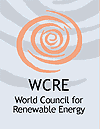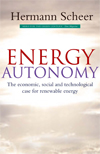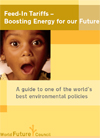Publications
 WCRE paper, June, 2004
WCRE paper, June, 2004
Synopsis of the results of the International Conference for Renewable Energy, "Renewables 2004", and related events, Bonn, June, 2004
 Article published in Le monde diplomatique, February 2007
Article published in Le monde diplomatique, February 2007 Une voie réaliste et accessible
Le 1er février sera publié le rapport du Groupement intergouvernemental sur les changements climatiques (GIEC) dont la parution a lieu tous les quatre ans. Une fois de plus sera posé le grave problème du réchauffement de la planète. Cette question majeure plaide pour le développement des énergies naturelles renouvelables, l’éolienne comme les autres, si l’on désire conserver un niveau raisonnable de confort dans les pays développés et élever considérablement celui des pays pauvres.
 Resolution for the International Parliamentary Forum on Renewable Energies, June 2nd, 2004, Bonn
Resolution for the International Parliamentary Forum on Renewable Energies, June 2nd, 2004, Bonn
The International Parliamentary Forum on Renewable Energies in Bonn on 2 June 2004, hosted by the German Bundestag in association with the International Conference for Renewable Energies (Renewables 2004), was chaired by Hermann Scheer.
 Resolution "Renewable Energies - The Challenge for the 21st Century" (pdf)
Resolution "Renewable Energies - The Challenge for the 21st Century" (pdf)
 Article published in Le Monde diplomatique, June 2006
Article published in Le Monde diplomatique, June 2006 Renewable energies are a realistic and affordable alternative
There is both bad news and good news for world energy supply. The bad news? Oil is running out. The good news? Oil is running out. And not only oil: sooner or later, every type of fossil energy will run out – including fossil uranium ore which is needed to make atomic fuel rods. The reason why oil became the most used form of energy was simple: because it is liquid, making it easier to use, it became the 20th Century's "Black Gold". Yet even John Rockefeller, the first and best-known of the oil magnates, spoke prophetically of "the devil's tears".
 WCRE paper, June, 2004
WCRE paper, June, 2004
Civilization at the Turning Point: A Breakthrough for Renewable Energy
World civilisation is at the turning point. Faced with an accelerating compound crisis of the globally established atomic/fossil energy system, an immediate breakthrough for Renewable Energies is inevitable. No more time can be wasted. Further postponement would be irresponsible and further excuses are unacceptable. Escalating oil prices indicate the depletion of fossil resources and the urgent need to replace the current mix of fossil transport fuels. The outcome of the elections in India indicates that the large majority of people who live in the rural areas of developing countries no longer accept their state of increasing poverty. This situation is largely the result of a lack of access to commercial energy. The ongoing climate change is causing an increase in flood and drought catastrophes. These catastrophes are an indication of the disastrous consequences of our society’s continuous use of fossil energy. Widespread power grid failures and blackouts in the westernized world demonstrate the limitations of atomic and fossil power production. The atomic catastrophe in Chernobyl, and the continually escalating dangers of atomic weapon proliferation, testify that the use of atomic technology is not a viable option for the future.
 Article published with Jane Taylor, March 2006
Article published with Jane Taylor, March 2006 An answer to James Lovelock
It is a well known experience, that even a high sophisticated scientists views about dangers don’t have adequate answers how to avoid it. So it is a very actual problem, that many protagonists who warn about the running climate catastrophe fail miserably in giving an adequate answer how to fight it. This leads to disastrous socio psychological consequences: people, mainly the young, are left alone with these dangers and don’t believe any more that there could be a solution. This creates no-future mentalities and, as the Californian sociologist Robert N. Bellah wrote in “Habits of the heart”, destroys the social ecology before the destruction of the ecology of nature happens.
 WCRE paper, June, 2004
WCRE paper, June, 2004
Future urban development with Renewable Energy: towards the global renewable energy habitat
The direction of modern urbanisation has reached a technological dead-end; the situation is extremely precarious, locally and globally. Global urbanisation has been fuelled by its dependency on cheap fossil fuel powered electrification and gasoline-powered transport systems. Now, as both fuel supplies approach their commercially attainable end, and it becomes apparent that almost three-quarters of man-made carbon emissions are derived from cities' fossil fuel consumption, all stops must be pulled out to go far beyond 'making cities
sustainable'. The challenge is no less than to rescue civilisation as we know it, and to avert the worst calamities.



